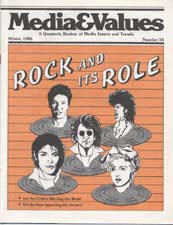MINORITIES: Ethnic Music: Dial 'G' for Ghetto
|
This article originally appeared in Issue# 34
|
Reflection / Action: Minorities
Ethnic segregation within rock music culture? Maybe yes, maybe no. But there certainly are ethnic musical neighborhoods. In current sales lingo, that's called market segmentation... in this case, along ethnic lines.
There is no one rock music audience or culture, but rather diverse rock audiences, fragmented by various factors. Ethnicity — including race and language — has influenced that fragmentation.
Black radio stations and TV cable networks play black rock music for mainly black audiences. The growing number of Spanish language radio stations (some 600 according to one recent estimate) play various forms of Latino music for principally Latino audiences.
Certainly much rock music cuts across ethnic lines. And, MTV reaches Americans of all races, religions, and national origins — although not of all musical persuasions. Yet MTV's musical line-up has been predominantly white, a penchant (policy?) that has provoked considerable protest from minority entertainers.
Some minority singers — Diana Ross, Jose Feliciano, Rita Coolidge, Michael Jackson, Vicki Carr, Buffy Sainte-Marie, Prince, and Irene Cars, for example — have wade the fabled "crossover" to the more lucrative "white market."
But for every Bill Cosby, Tina Turner and Julio Iglesias reaching that sought after mass audience, legions of minority performers are limited to the ethnic clubs and stations spotlighting their specialized brands of music and humor, a dilemma dramatized with poignancy with the recent film "Crossover Dreams."
Rock music culture? Rock music ethnic cultures? Trumpets may have brought down the walls of Jericho, but heavy metal has yet to demolish racial and cultural barriers in America's ethnic mosaic.



